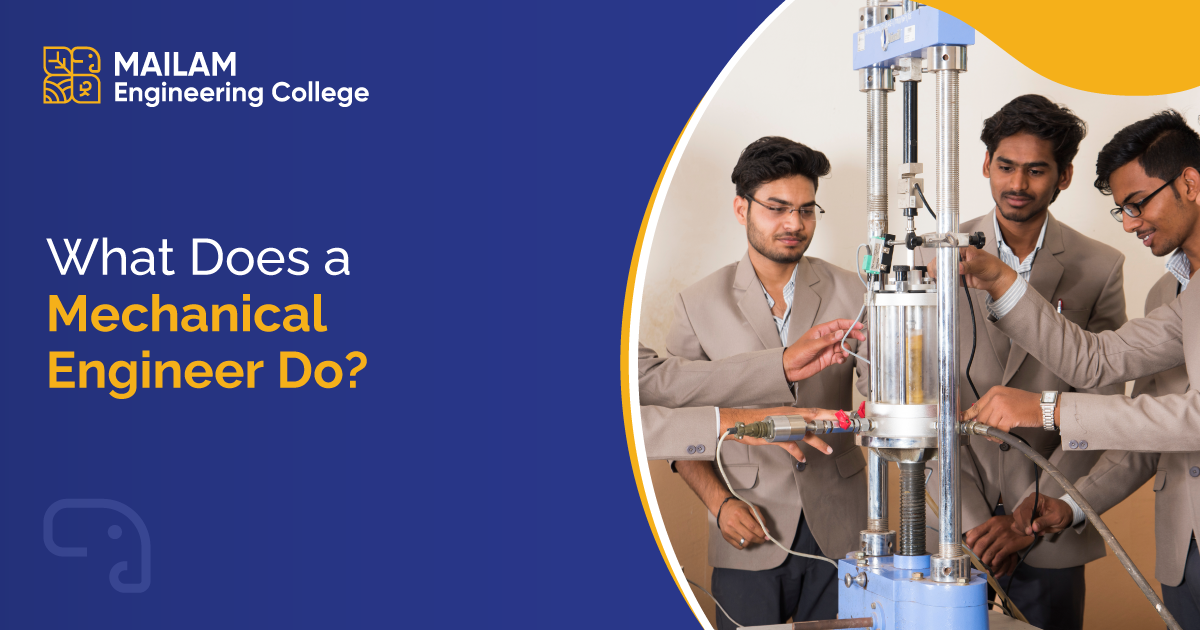Introduction
You’re not alone if you’ve ever noticed what a mechanical engineer does. Mechanical engineering is often referred to as the backbone of engineering due to its wide range of applications and integral involvement in automobile development. Mechanical engineers design, analyse, and manufacture everything from small components to massive strategies.
Mechanical engineers use multiple work methods and techniques. Understanding what mechanical engineers do is essential for anyone considering a career in this dynamic field.
What Does a Mechanical Engineer Do?
- Design and Development Mechanical engineers are mainly responsible for designing mechanical modules, systems and components. This process involves creating detailed technical drawings and using computer-aided design (CAD) software to build virtual models. The engineers always consider factors such as material properties, manufacturing processes, and cost-effectiveness during the design phase.
- Research and Analysis Another key aspect of mechanical engineering involves researching to develop new technologies, materials, and processes and to understand market requirements. This could include patterns of renewable energy sources, stable energy efficiency, or improving manufacturing equipment. Mechanical engineers use analytical tools to evaluate data (accurate values) and determine the feasibility of their designs and concepts.
- Testing and Evaluation Mechanical engineers perform different testing sets and evaluate prototypes and final products. This includes stress, load, temperature, and sustain testing to ensure the product meets all safety and performance standards. Solid testing helps engineers identify priority and severity weaknesses and make necessary adjustments before mass production.
- Project Management Mechanical engineers usually take on project management roles (Based on work experience) to oversee the development and execution of engineering projects. This includes planning timelines, coordinating with other engineers and specialists, managing budgets, and ensuring compliance with safety regulations. Effective communication and leadership skills are essential for managing teams and assuring the project’s success.
- Collaboration with Other Engineers In their role, mechanical engineers frequently collaborate with professionals from other engineering disciplines, such as electrical, civil, and industrial engineers. This work pattern is essential for projects that require a solid understanding of various systems, processes, methods, and integrations, such as designing an automotive assembly line or building an HVAC system.
- Maintenance and Repair What a mechanical engineer does not end with design and development. Many mechanical engineers are involved in the maintenance and repair of mechanical systems. This includes regular inspections, monitoring, troubleshooting, and implementing solutions to improve product reliability and efficiency.
Industries Where Mechanical Engineers Play Key Roles
Mechanical engineers work in a major set of industries. Here are some top sectors where their skills are essential:
- Automotive Industry Mechanical engineers are primarily involved in the design and manufacturing of vehicles. They work on various components, including engines, transmissions, and braking systems. They also focus on improving fuel efficiency and developing electric and hybrid cars.
- Aerospace Industry In aerospace, mechanical engineers design aircraft and spacecraft components, from engines to structural components. They core understand aerodynamics, materials, and propulsion systems to ensure safety and performance in flight.
- Energy Sector Mechanical engineers play a crucial role in developing and maintaining energy systems, including traditional fossil fuels and renewable energy sources like wind, solar, and geothermal. They work on designing efficient systems for power generation and distribution.
- Manufacturing : Mechanical engineers design production processes and equipment in factories. They work to improve productivity, quality, and safety by analysing the improvisation of machine systems to identify functionality.
- Robotics and Automation Advancement in the tech sector: Mechanical engineers contribute significantly to developing robots and automated systems. They design robotic components and control systems and understand movement, contact, rotation, and environmental interaction mechanics.
- Biomedical Engineering In biomedical applications, mechanical engineers design medical devices, prosthetics, and diagnostic equipment. They develop solutions that improve healthcare operations based on their knowledge of mechanics and materials.
Skills Required for a Mechanical Engineer
To effectively perform their work, mechanical engineers should master the given technical and soft skills styles:
- Key Analytical Skills Mechanical engineers need to solve major engineering problems, requiring strong analytical skills to estimate data, simulate processes, and assess designs.
- Proficiency in CAD Software: A solid understanding of CAD software (such as AutoCAD, SolidWorks, or CATIA) is essential for creating and modifying designs and prototypes.
| Did you know? The demand for mechanical engineers in India is expected to grow by over 20% by 2030. This growth is purely depend on the development of industries such as automotive, mechanics, aerospace, and Nanotechnology |
- Good Communication Skills Mechanical engineers should communicate clearly with team members, clients, and stakeholders. This includes presenting ideas and technical information in a clear and understandable format.
- Problem-solving Skills The ability to think and develop innovative ideas for solutions to challenges (Machinery) is essential for mechanical engineers.
- Attention to Detail The most crucial aspect of mechanical engineering design and analysis is minor errors, which can lead to significant safety issues or functional failures. Use (structured design process) methodology to avoid the initial phase of designs.
Core subjects
Students generally pursue a Bachelor of Engineering (B.E) or Bachelor of Technology (B.Tech) in Mechanical Engineering or a related field to become a mechanical engineer. The course usually covers subjects such as:
- Thermodynamics
- Fluid Mechanics
- Dynamics and Kinematics
- Materials Science
- Control Systems
- Machine Design
Many mechanical engineers choose to further their education by obtaining a Master’s degree or even a PhD in specialised areas of mechanical engineering, which can open up advanced research and administrative roles.
Designation, Salary: Mechanical Engineer
| Designation | Salary Range (per annum) |
| Design Engineer | ₹3,00,000 – ₹8,00,000 |
| Manufacturing Engineer | ₹3,50,000 – ₹7,50,000 |
| Quality Control Engineer | ₹3,00,000 – ₹6,50,000 |
| Research and Development (R&D) Engineer | ₹4,00,000 – ₹10,00,000 |
| Project Engineer | ₹3,50,000 – ₹9,00,000 |
| Production Engineer | ₹3,00,000 – ₹7,00,000 |
| Maintenance Engineer | ₹3,00,000 – ₹8,00,000 |
| Sales and Application Engineer | ₹3,50,000 – ₹10,00,000 |
| Thermal Engineer | ₹4,00,000 – ₹9,00,000 |
| Automotive Engineer | ₹4,00,000 – ₹12,00,000 |
The future of mechanical engineering
- Artificial Intelligence (AI) and Machine Learning (ML): As industries adapt to AI and ML, mechanical engineers will use these technologies for design optimisation, predictive maintenance, and decision-making. These tools allow engineers to analyse complex datasets, simulate scenarios, and automate processes, leading to more efficient and innovative solutions.
- Internet of Things (IoT): This IOT connectivity enhances system performance and efficiency, particularly in manufacturing, energy management, and smart infrastructure.
- Sustainable Manufacturing Practices: Mechanical engineers will be at the majority of implementing green manufacturing techniques, focusing on reducing waste, emissions, and energy consumption throughout production processes. Life Cycle Assessment (LCA) and eco-design principles will guide their projects to ensure sustainability.
Advancements in Additive Manufacturing and 3D Printing
- Rapid Prototyping and Customisation: The ability to quickly prototype complex designs through additive manufacturing presents opportunities for innovation in mechanical engineering. Engineers will utilise 3D printing to create custom components with intricate geometries that are often difficult to do using traditional manufacturing methods. This will significantly speed up product development cycles and reduce production costs.
- Materials Science Innovations: The future of mechanical engineering will involve understanding and applying new materials specifically designed for additive manufacturing, such as advanced polymers and metals.
Robotics and Automation
- Industry 4.0: The fourth industrial revolution is characterised by increased automation, smart devices, and robotics. Mechanical engineers will be required to design and integrate robotic systems into manufacturing and other sectors.
- Collaborative Robots (Cobots): The rise of Cobots robots, which work alongside humans in shared environments, will require mechanical engineers to focus on design principles that ensure safety, usability, and effectiveness in these joint operations.
Mechanical Engineering At Mailam Engineering College
Mailam Engineering College is dedicated to introducing the next generation of mechanical engineers through innovative education, hands-on training, and excellent mentorship. Our mission is to prepare students for real-world challenges by providing them with the skills, knowledge, and creativity required to excel in their careers.
Mechanical Engineering Degrees
The B.Tech in Mechanical Engineering at Mailam Engineering College provides outstanding learning opportunities through a combination of core theory principles and training.
UG Courses Opportunities
We offer a great study platform for students to gain hands-on experience. From running simulations to data analysis, students actively participate in innovative projects. From CAD to Fluid Mechanics, laboratories, spread across well-maintained facilities, are matched with the latest technologies to support various research initiatives. Many projects also provide financial support, helping students grow academically and professionally.
Accreditation and Standards
Our Mechanical Engineering program is accredited and sticks to high-quality standards. This ensures that our graduates are recognised for their expertise and are well-prepared to meet professional demands. Accreditation reflects our ongoing commitment to maintaining the excellence of our institution.
Conclusion
In conclusion, understanding what a mechanical engineer does highlights their integral role in designing and improving systems that impact almost every part of our daily lives. Mechanical engineers are at the topmost in technological developments, from automotive design to biomedical devices and renewable energy systems. For future mechanical engineers entering this field, choosing a degree in mechanical engineering provides a rich platform to launch a successful career. With an array of specialisations and industries to choose from, the question of what mechanical engineers do ultimately leads to a world of opportunities in innovation and design.
FAQ
1. What is the primary role of a mechanical engineer?
The primary role of a mechanical engineer is to design, analyse, and improve mechanical systems and components, ensuring they are efficient, safe, and reliable.
2. What industries have high chances to get jobs for mechanical engineers?
Mechanical engineers work in various industries, including automotive, aerospace, energy, manufacturing, robotics, and biomedical engineering.
3. What skills are essential for mechanical engineers?
Essential skills include analytical thinking, proficiency in CAD software, methodologies, communication skills, and project management.
4. Is Mechanical engineering course available in Mailam?
Yes, At Mailam we offer a Bachelor’s degree in Mechanical Engineering. With best placement support to our students.
5. What is the job outlook for mechanical engineers?
The job outlook for mechanical engineers is positive, with demand expected to remain stable as they play crucial roles in technology development and innovation across various sectors.







